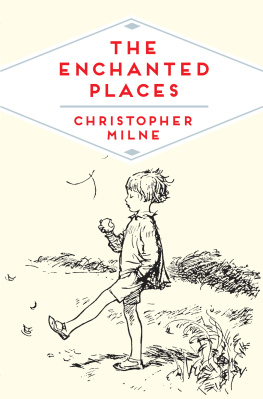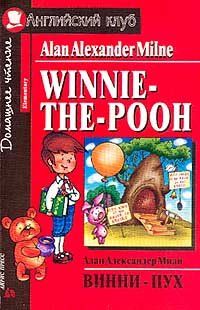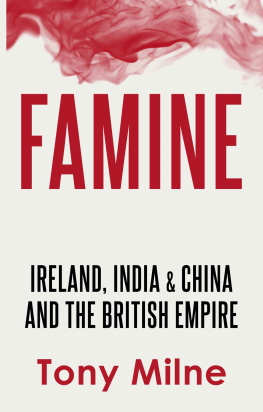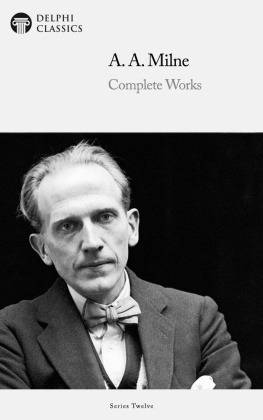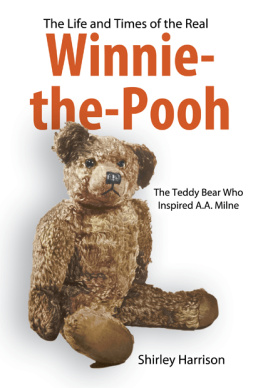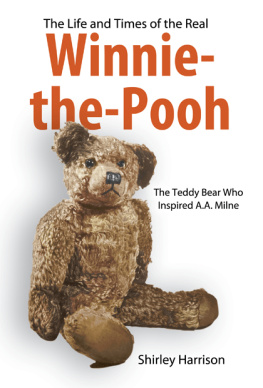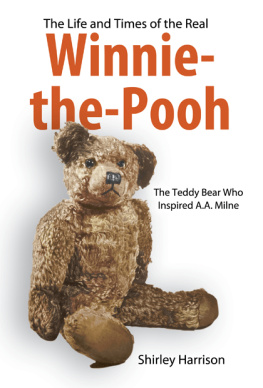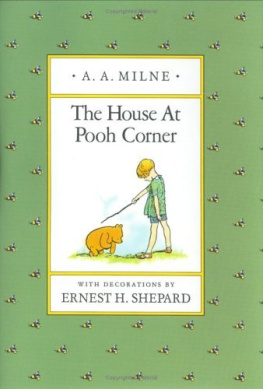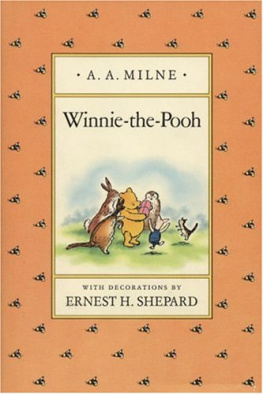Christopher Milne
THE
ENCHANTED
PLACES
A C HILDHOOD M EMOIR
PAN BOOKS
For Olive Brockwell
Alice to others
But Nou to me.
To remind you of those enchanted places
Where the past will always be present.
A CKNOWLEDGEMENTS
The author and the publishers wish to thank Mr Andrew Holmes, who made the film Mr Shepard and Mr Milne (photographer Bob Davis), for giving them access to his documentary material on E. H. Shepard and A. A. Milne.
Introduction
From time to time I get a letter from an unknown asking for my help. The sender is a student (or it may be a teacher) and is writing a thesis (or it may be a research paper), and the subject is A. A. Milne (or it may be Winnie-the-Pooh). And he (or it may be she) would be grateful if I could oblige by answering a few questions about myself.
Forty years ago such letters were addressed to my father, and I can well remember seeing them on the breakfast table every morning and watching him open them. There were letters from students requesting biographical details; there were letters from children wanting autographs; letters from hopeful imitators asking for advice on how to get their books published; letters from Secretaries of Societies requesting his presence at some function or other; even occasional letters from people down on their luck, short of cash and grateful for anything that could be spared. He would read them silently, then pass them, one at a time, to my mother.
What do you think?
Probably Wol.
I thought so too.
So Wol it often was.
You may remember the occasion. Rabbit had found the notice saying GON OUT BACKSON BISY BACKSON and had taken it round to Owl for his advice. You may even remember the actual lines. Owl asks:
What did you do?
Nothing.
The best thing, said Owl wisely.
Somehow, so often, nothing did seem the best thing to do. To answer them was impossible. To explain why you couldnt answer them seemed unnecessarily unkind. So they remained unanswered. Wol. And now that these letters are coming my way, I, too, find that Wol is often the best, indeed the only possible thing. But it leaves me feeling unhappy...
To some extent, then, this book is an attempt to salve my conscience; and it may perhaps be some slight consolation to all those who have written and waited in vain for a reply that this, in a sense therefore, is their reply. Belated, I confess, but at least a fairly full one.
You can call it a sort of companion to the Pooh books. In the first chapters I have attempted a picture of Milne family life, the family life that both inspired and was subsequently inspired by the books. In the later chapters I have attempted a picture of my father. If I have imagined an audience it has been a gathering of Poohs friends and admirers, and I have tried to answer the sort of questions that I imagined friends of Pooh wanting to ask. They would want to know about the real Pooh and the real Forest and whether there really was an Alice. They would want to know something about the real little boy who played with Pooh in the Forest. And finally they would want to know something about the man who turned all these things into stories and verses. They would not be particularly interested to learn what happened afterwards: what happened to the little boy when he grew up.
Yet the little boy did grow up and it is the grown-up little boy who is writing now. And something of what he was by nature and something of what he became as a result of his experience will colour his words.
So if I seem ill at ease posing as Christopher Robin this is because posing as Christopher Robin does today make me feel ill at ease. And if I seem to write most happily about the ordinary things that boys do who live in the country it is because this is the part of my childhood that I look back upon with the greatest affection. If I had been a different sort of person I would have felt it all differently and would have written a different book.
In other words, I am really making a double appearance, first as the boy I am describing and secondly as the adult through whose eyes I am seeing him. If it were obvious how the one became the other then no more need be said; but it is not obvious and this leads to the question: Should I perhaps not fill in the gap? My instinct was to answer No and to refuse for two reasons. First, it had nothing to do with the Pooh story and so was of no concern to my imagined audience. Secondly, it is one thing to write about a distant and happy period of ones life but quite another to write about a nearer and very much less happy period.
In the end, however, persuasion overcame instinct, and I have added an Epilogue. I say this now to make it clear that the story I originally set out to tell comes to an end at the end of Chapter 22. The Epilogue is a different story addressed to a different audience. It is the story of the effect on someones life of an unusual event that occurred when he was a child. You may imagine, if you like, an Interval between the two, an Interval during which the audience can get up and stretch their legs. And if any of them decide at this point to make for the exit, I shall quite understand.
1. The Interview
Cotchford Farm on an August morning somewhere around the year 1932. The penstemons, the bergamots, the phloxes, the heleniums, the rudbeckias, the dahlias and even the solitary coreopsis that had seeded itself so cleverly in the paving stones by the sundial had all been told the evening before that today they must look their best. But as yet for it was barely ten oclock there was only one person in the garden to see how nicely they were doing it. He was a tall man, dark and handsome, wearing a brown suit and a brown homburg hat, and he was sweeping the brick path that ran beside the house. For it was Saturday.
George Tasker always swept the path on a Saturday, not because it particularly needed a weekly sweep (though today was different) but because Saturday morning was when he got paid. The shyness and embarrassment that this always caused him had led him to devise a sort of ritual to which my mother had learned to respond. He didnt like to knock on the door. He couldnt just stand around hoping to be noticed. Pulling up weeds from the beds by the house was her work, not his. While if he did anything more distant, he might never get seen at all. So he brought down his big brush and swept; and this made just the right amount of noise, not enough to disturb the Master but enough to remind the Mistress in case she had forgotten.
She had not forgotten. The side door opened and she emerged.
Good morning, Tasker.
Good morning, Madam.
A brief conversation followed, for this too was part of the ritual. The Mistress said how pleased she was that it was all looking so pretty today, because someone was coming down from London specially to see it; and Tasker agreed modestly that it was looking quite nice. The Mistress said werent we lucky with the weather; and Tasker said werent we, though we could do with a drop of rain. And then the moment arrived and the pound notes were able to change hands and Tasker was able to sound slightly surprised as well as grateful, as if he had forgotten all about its being Saturday. A moment later the Mistress excused herself as she still had rather a lot to do to get everything ready; and Tasker, after sweeping another yard of path to complete the ritual, shouldered his broom and went home.
Let us call her Miss Brown. Miss Brown was a journalist and she was coming down from London to meet us, to be shown around, to ask a lot of questions and then to write an article about us for a magazine. So my mother (after paying Tasker) was going round the garden tidying things away golf clubs on the putting lawn, a fishing net by the stream, a pullover and a cushion in the Alcove, a copy of last weeks
Next page
